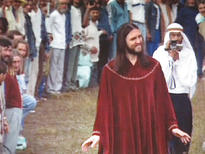BORIS GROYS - RELIGION AS MEDIUM
LECTURE
From Religious Ritual to Mechanical Repetition – and Back Again
In his lecture on Religion as Medium, Boris Groys will highlight two closely intertwined – and often neglected – aspects of contemporary ‘fundamentalist’ religious practice.
The first of these is the highly ritualistic and text-oriented character of fundamentalism, as opposed to an older, now effectively marginalised, idea of religion as something wholly internal and spiritual, independent of any material medium. The second, interwoven aspect, concerns religion as medium, that is to say, the infinitely repeated and mechanically reproduced messages as encountered nowadays on the Internet and in amateur videos. Groys makes no real distinction between Islamic or Catholic fundamentalists; what they have in common is their ‘lack of opinion’. God is ultimately hidden and unknowable; the only thing left to do is blindly repeat the rituals.
Boris Groys hopes to overturn some of our deeply held opinions and certainties, such as the purported reactionary and pre-Modern nature of religious fundamentalist organisations. For Groys, contemporary religious fundamentalism is actually its opposite; that is to say, a very modern and radical (by-)product of the Enlightenment. No longer paying attention to the ‘spirit’, but rather to the ‘text’ (the materiality of the message), he shows modern religious fundamentalism to be a radically materialistic movement. Moreover, and paradoxically, due to its essentially repetitive character, fundamentalism is a revolutionary movement, insofar as (according to Walter Benjamin) it is precisely this repetition that causes a rupture in the historical continuity of life.
In his lecture on Religion as Medium, Boris Groys will highlight two closely intertwined – and often neglected – aspects of contemporary ‘fundamentalist’ religious practice.
The first of these is the highly ritualistic and text-oriented character of fundamentalism, as opposed to an older, now effectively marginalised, idea of religion as something wholly internal and spiritual, independent of any material medium. The second, interwoven aspect, concerns religion as medium, that is to say, the infinitely repeated and mechanically reproduced messages as encountered nowadays on the Internet and in amateur videos. Groys makes no real distinction between Islamic or Catholic fundamentalists; what they have in common is their ‘lack of opinion’. God is ultimately hidden and unknowable; the only thing left to do is blindly repeat the rituals.
Boris Groys hopes to overturn some of our deeply held opinions and certainties, such as the purported reactionary and pre-Modern nature of religious fundamentalist organisations. For Groys, contemporary religious fundamentalism is actually its opposite; that is to say, a very modern and radical (by-)product of the Enlightenment. No longer paying attention to the ‘spirit’, but rather to the ‘text’ (the materiality of the message), he shows modern religious fundamentalism to be a radically materialistic movement. Moreover, and paradoxically, due to its essentially repetitive character, fundamentalism is a revolutionary movement, insofar as (according to Walter Benjamin) it is precisely this repetition that causes a rupture in the historical continuity of life.
Related events
This event is part of FRONT-end: Launch of the online media library catalogue

-
Sat 20.9.2008
20:30 - 23:00 -
Practical info
Location:
Argos
Werfstraat 13 Rue du Chantier
1000 Brussels
Entrance Fee:
5 euro - Artists